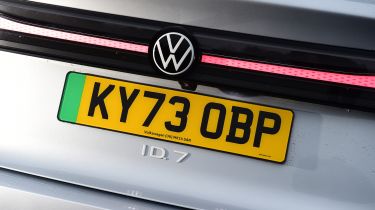Plenty of UK car buyers still love a new car number plate
Is a new number plate still the status symbol it once was? Our exclusive poll suggests that car buyers do care

Having the latest number plate on the front of your new car is still a significant draw for car buyers in the UK. An exclusive poll of over 350 Auto Express readers indicated that 35 per cent would still consider timing the purchase of their next car to coincide with the March and September number plate changes, in order to be one of the first out on the road with the new plate.
The twice-yearly number plate change arrived way back in 1999 and we’ve been following the current alphanumerical plate format - where numbers are used to indicate the year of first registration - since 2001. The number plate changes on 1 March and 1 September each year are still the focus of significant car market activity, with dealer promotions and new model launches scheduled around these periods.
In 2023, March and September were easily the biggest two months for new car registrations accounting for 15.1 per cent (287,825 cars) and 14.3 per cent (272,610 cars) respectively. The next biggest month was June with 9.3 per cent (177,266 cars) of the year’s total. Registrations were more evenly spread through the year in 2023 than they have been in the past, which could be partly attributed to supply constraints in the early part of the year caused by the long hangover from the COVID pandemic. In 2019, however, 19.8 per cent of the total registrations happened in the month of March.
While the number plate changes may not have quite the impact they once did, it seems there’s still considerable consumer buy-in around them. The Auto Express poll suggests the added cachet of that fresh age identifier on the nose of a new car remains a key draw. Just over 32 per cent of those polled said that they felt a new number plate makes a car more desirable and, when asked to rate how important having a new number plate was to them, the average rating was four out of 10.
A sizeable 82 per cent of those polled also stated that they have a ‘good understanding’ of how the current UK car number plate system works and what the combination of letters and numbers means, indicating that motorists do pay attention to the registrations they see on cars out on the roads.
There’s hard data to back-up the ongoing consumer desire for a new number plate, too. CAP HPI’s director of valuations, Derren Martin, explains that new plates deliver a clear real-world boost in a car’s value, even if the effect is on the wane. “From a valuation perspective, we still see a 4 per cent average uplift for March and September plates compared to previous plates, for all the models we value - up to 20 years old. Over the years, we have seen that uplift reduce and for current new models in the market, the average uplift is 2 per cent on average.”
Mike Hawes, Society of Motor Manufacturers and Traders chief executive, is in no doubt about the importance the plate changes still hold for the industry. “March and September are the busiest months for new car registrations, driven primarily by the biannual number plate change. Having the latest plate is an obvious way to show you are driving a brand new car, and these months often set the tone for the market as a whole. They are, therefore, of great importance not just for the industry but for consumers who can benefit from attractive offers and deals.”
What are your thoughts on the appeal, or otherwise, of the new car number plate in 2024? Have your say in the comments…
Find a car with the experts




